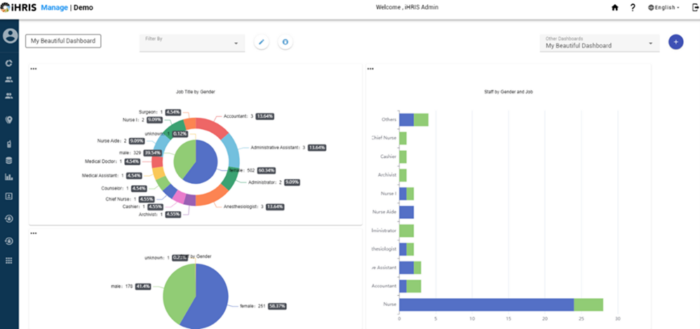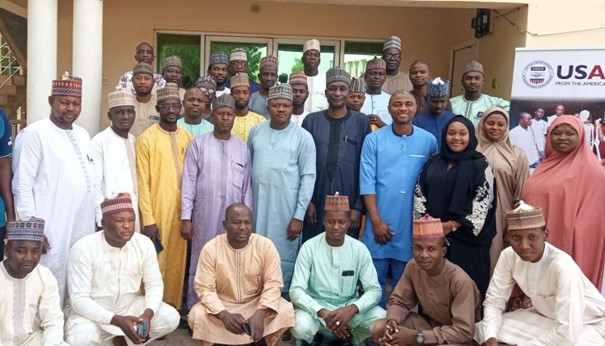
Leveraging the Power of Human Resource Information Systems to Enhance Nigeria’s Health Workforce
Nigeria’s health care system faces a critical bottleneck to serving its population of more than 225 million: a shortage of health workers, including nurses, midwives, and community health extension workers (CHEWs). This shortage disproportionately impacts rural areas, leaving many Nigerians without access to high-quality care. Nigeria’s health worker shortage is compounded by challenges in implementing human resource information systems (HRIS). Well-functioning human resource information systems provide a technology-based solution to managing various HR functions within health care and are essential for informed decision-making and workforce planning. In Nigeria, many state governments’ human resource information systems are plagued by fragmented data collection and outdated information. This hinders the governments’ abilities to effectively plan, recruit, train, and deploy health care workers, particularly nurses, midwives, and community health workers—the backbone of primary health care delivery. Without comprehensive reforms and investments, Nigeria’s HRIS will continue to hinder efforts to build a resilient health care workforce and strengthen the overall health system.
Strengthening HRIS in Nigeria
Working under the USAID Health Workforce Management (HWM) Activity, Banyan Global is strengthening human resource information systems in seven states in Nigeria (Bauchi, Kebbi, Ebony, Sokoto, Adamawa, Borno, and Yobe) and the Federal Capital Territory. Our HRIS strategy has two key pillars. The first pillar is to establish well-functioning HRIS at the state level. These state-level HRIS are called State Health Workforce Registries (SHWRs). The second pillar is to introduce the Integrated Human Resources for Health Information System Version 5.0 (iHRIS 5.0), a customizable health workforce information systems software. These electronic systems go beyond basic data collection. They function as living, comprehensive databases, gathering information from various health facilities across each state. They paint a clear picture of the current health care workforce, pinpointing critical shortages and skill gaps.

A snapshot of the iHRIS 5.0 platform demonstrating its data analysis and reporting capabilities.
Through its HRIS initiatives, HWM aims to increase the Nigerian federal and state governments’ capacities to plan, recruit, train, deploy, and retain nurses, midwives, and community health workers. HWM is leading efforts to strengthen HRIS governance structures, institutionalize standard operating procedures for HRH data management, and collect, clean, and update data in the country’s health care workforce databases.
Scaling Up Innovation: Introducing iHRIS 5.0
To date, Banyan Global has assisted Bauchi, Kebbi, Ebony, Sokoto and the Federal Capital Territory to establish and strengthen State Health Workforce Registeries. The HWM team is now working with these states as well as Adamawa, Borno, and Yobe to roll out iHRIS 5.0, which goes beyond static reports to enhance data access and utilization. iHRIS 5.0 is a customizable system that allows states to track and make routine updates to data related to health worker training, qualifications, deployment, and even professional development. This empowers state HR managers to make informed decisions based on the latest data. Additionally, HWM provides comprehensive training, equipping HR managers to leverage the system’s robust data analysis and reporting functions.
This data-driven approach has already yielded impressive results. For instance, in Kebbi State, iHRIS 5.0’s reports were instrumental in successfully advocating for the recruitment of additional health workers, directly addressing a critical need in the state. As a result, the Kebbi State Ministry of Health allocated funds for 450 community health extension workers in its 2024 budget. Moving forward, HWM will continue to support advocacy initiatives utilizing these reports to promote positive policy reform.
“The HWM Activity has done most of the heavy lifting to customize iHRIS 5.0 to the Nigerian health context,” said Dr. Omoluabi. “I hope that other states can take advantage of what we have done to address their health workforce management challenges.”
To build sufficient digital literacy to operate iHRIS, HWM has provided regular group training and individual coaching for HR managers. Recently, the HWM team conducted a national iHRIS training and, in collaboration with the Kebbi State Ministry of Health, trained 21 HR professionals on iHRIS 5.0. This initiative, supported by high-ranking officials, reflects the Nigerian government’s commitment to improving its utilization of HRIS. The training equipped participants with new skills on how to navigate and leverage the latest employment records, ensuring a more responsive and data-driven approach to health workforce management in Kebbi State.

Health workers engaged in an HWM-led iHRIS 5.0 training in Kebbi State.
“HWM’s next major initiative will explore developing a mobile app, allowing health workers whose data are already in the State Health Workforce Registries to update their own records in real time,” said HWM Country Director Anddy Omoluabi. “This will not only eliminate outdated data in the registries but also result in significant cost savings.”
The HWM Activity is advancing innovations to help Nigeria address its health system challenges. Continuous innovation, rooted in the principles of technical excellence, multisectoral collaboration, and local ownership, is driving change, and paving the way for a more resilient and sustainable health system. Banyan Global is proud to have been named USAID Small Business of the Year 2023, nominated for its working strengthening HRIS and the health workforce more broadly in in Nigeria.
